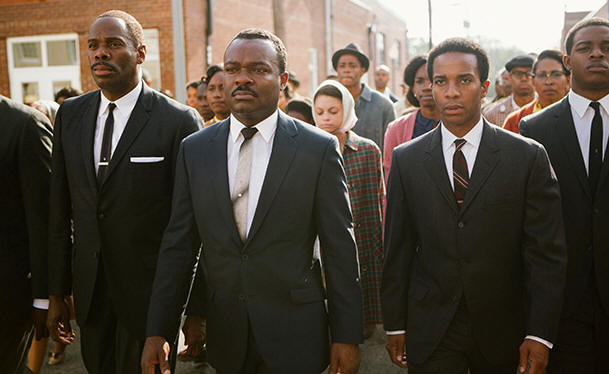MOVIE REVIEWS |
INTERVIEWS |
YOUTUBE |
NEWS
|
EDITORIALS | EVENTS |
AUDIO |
ESSAYS |
ARCHIVES |
CONTACT
|
PHOTOS |
COMING SOON|
EXAMINER.COM FILM ARTICLES
||HOME


Sunday, December 21, 2014
MOVIE REVIEW
Selma
Appeals To Conscience, Unity And Justice, In 1965

Colman
Domingo, David Oyelowo and Andre Holland, in Ava DuVernay's scintillating and
rousing "Selma".
Paramount Pictures
by
Omar P.L. Moore/PopcornReel.com
 FOLLOW
FOLLOW
Sunday,
December 21,
2014
"Selma" is the perfect title for Ava DuVernay's brilliant new
film. It
crystallizes a seminal moment in the 1960s Civil Rights Movement in America
through demands for justice, non-violence and a radical transformation of the
collective conscience. "Selma" goes behind key moments and through
specific points of an arduous, deadly Bloody Sunday journey of March 7, 1965, in a mosaic of nuance, terror and triumph.
Pulsing with humanity, grace and power, "Selma" is a grand yet
intimate look at process: the process of achieving justice, the process of a
time, place and evolution of a people and, crucially, of a movement and a
country. Ms. DuVernay's film is an immersive, tactical, strategic colloquy
and at times an electrifying public debate about the question of a people's very
existence and their right to exist and participate in a supposed democracy.
And "Selma" is extraordinary.
Violence punctuates and competes with the film's verbalized de jure injustices:
Annie Lee Cooper (Oprah Winfrey) faces barriers to entry in enfranchisement at
her voting precinct in Selma to register. The scope of these two polar
opposite cadences -- violence and vocalization -- are given large, unblinking
canvases as movies in their own right, magnified in their American time and
present. The issue of the right to vote for Blacks in 1965 is the
centerpiece upon which "Selma" stands. This issue is the Old Glory flag in
the sand that Ms. DuVernay, and the Civil Rights Movement of yesteryear (and
now) plants.
The U.S. Supreme Court however, yanked from the soil the American flag that Ms.
DuVernay has now metaphorically re-planted, when it
struck down a key part (Section 4) of the 1965 Voting
Rights Act in 2013, thereby keeping alive the questions "Selma"
re-establishes and, hence, Black people's enduring struggle for justice.
The U.S. Supreme Court decision of 2013, which
said that voting was no longer an impediment to Blacks in states where a legacy
of discrimination existed, relied on the idea that because President Obama was
elected, times were therefore different. One of the states the Court's
evisceration of what Dr. King and so many fought for? None other than
Alabama, the state from which the city of the film's title belongs.
The decision, Chief Justice Roberts wrote in
2013, is "based on 40-year-old facts having no logical relationship to the
present day." Justice Roberts' tone-deaf view of progress is a satellite
view held by large numbers of people about a continuous struggle and illustrates
why Ms. DuVernay's film is so important, and why she uses "Selma" to sound the
alarm to spark and awaken a new generation and energize, edify and inspire them
to action. Given recent events, pride and emotion will swell even more so
within all who watch "Selma". "Selma" is an instant classic, a film that
will be revered and applauded throughout the annals of American history, long
after we are gone.
It is in its renewed and fully-calibrated look at very recent American history
in this fertile and volatile present-day American social and political climate
that "Selma" achieves its greatest heights. The film is a vitally
necessary reeducation of an American public, some of whom, like Chief Justice
Roberts, may insist that enduring progress has been made.
Progress and process are key measuring sticks. And as "Selma" shows, for
Blacks and for America, steps are gained, but can also be quickly knocked down
or scuttled, either by violence or a decision.
In setting the table of its tense, atmospheric stage, "Selma" covers America's
systemic and centuries-long attack on the Black body and the Black body politic.
There's a series of psychological and physical punishments (mostly the latter)
that burn holes through your heart. Some of these episodes arrive without
warning, which is usually how violence strikes. Shocks to the system.
And your conscience.
If there's Frederick Douglass and Abraham Lincoln talking in 1863, then, 100
years-plus later, Martin Luther King and Lyndon Baines Johnson are talking.
"Selma" shows the process of discussion, the stages of graduation upon which
Blacks have had to fight for to be afforded the basic dignities of America's
promise. In Mr. Douglass's day it was the question of a graduation from
enslavement. In Dr. King's, the right to vote and exercise the
preciousness of the franchise. In Barack Obama's day, the right to vote
unencumbered in the South (through Chief Justice Roberts' decision) and
elsewhere (through voting machine manipulation by corporations) as well as the
continuing violence by the state (in Missouri, Ohio, New York, Arizona, Utah and
everywhere) against Blacks.
The poster for "Selma" keenly reflects Barack Obama's day, as well as 1965, and
it, like the film itself, is timeless. "Selma" illustrates the Black
non-violent civil disobedience struggle in an innately violent society.
Each element of that struggle has distinctly identified names and faces of
people many may not know. These brave, determined and often unsung
individuals are calibrated and given full voice, through Paul Webb's screenplay,
lensed through Bradford Young's great cinematography and Ms. DuVernay's superb
direction, in the best-directed film of 2014. "Selma" covers all the
bases. So does Aisha Coley's magnificent casting.
Ms. DuVernay never seeks to canonize Dr. King, nor make him a hallowed
icon of perfection. She gives him the dimension and respect America
at large has never completely and honestly afforded him. (Distilling him
to a single speech, or holding Dr. King holiday mattress sales today seem
awkward at best, and disrespectful, for example.)
That said, Mr. Oyelowo's stunning performance is
rich, and he breathes life into Dr. King by allowing King to breathe as a human
being. Mr. Oyelowo's King is measured, unwavering and very unlike the staid, safe-for consumption portrait the media often cultivates. "Let me hear God's
words," he intones to a famous singer when times get perilous. We see
the toll, the price, the physical and mental travails on Dr. King.

Carmen Ejogo as Coretta Scott King. She, and the
rest of this impeccable cast, is excellent .
Paramount Pictures
Strikes of violence are not isolated or limited, and exist as distinct
punctuations amidst a verbal percussive and persuasion to America, and to the White House, where
Dr. King has been assiduously lobbying LBJ (Tom Wilkinson, in good form here).
There's layers of voices and layers of violence, and throughout "Selma" these
clash as discordantly as possible. Voices? Or violence? Which
of those will ultimately win out?
Much of the director's own fresh breath of life for Dr. King is to correct the
hagiographic rendering history has often bestowed upon him. The Dr. King
that America and the world has heretofore known is a safe, polished man, viewed
as perfect -- as destructive a packaging as Sidney Poitier's character in "Guess
Who's Coming To Dinner" (1967) ever was. Ms. DuVernay humanizes Dr. King
in a way that no previous film on television incarnation (even that of the late,
great Paul Winfield).
"Selma", a cultural touchstone and restorative film, is a careful update and
inclusion of the expanded spectrum of players on a global stage. King, and
the Civil Rights history gets a fulsome replenishment for today.
The director also gives the movement its proper respect and perspective, placing
us squarely inside the intricacies and internecine aspects of its different
methods and personality clashes. This declarative authenticating and
personalization of individuals -- Black ones -- is a notable distinction in
Hollywood studio film, and a refreshing, resolute rejoinder to a long-held view
in some white circles that Blacks are a monolith. (Just look at the recent
Amy Pascal-Scott Rudin Sony emails if you doubt me.)
That Ms. DuVernay gives diverse voices (women, young, old, white and Black)
their proper place on the mantelpiece of Americana and as American patriots, is
not only significant but reaffirms the unassailable truth that a movement never
dies, even if some of its figures do, but even more to the point -- that the
fallen are always remembered. Fittingly, the film is titled "Selma", which
gives Ms. DuVernay the appropriate latitude to make an even greater, salutary
and impactful film that encompasses the contribution of all towards making
America a greater, more hospitable place.
One reason "Selma" is so very alive is its dual activist parchment: it retools
and more accurately depicts the realities of the people then who fought for
today, while portending and galvanizing the present generation that fights for
tomorrow.
"Selma", even apart from today's headlines, is constructed as a very vivid and
present experience. Its unflinching look at state violence and its
pictorial representation of what some today argue so fervently for --"state's
rights" -- aka the right of the state to brutalize and block Black voters at
will and pervert the very process some white Southerners then (and some whites
in all places today) claimed to believe in, ring deep and true. The film
is a salute and reaffirmation of the most quintessential American right: the
right to protest and the enduring right to non-violence. This principle
flies in the very face of the violence America was founded on. And it is
boldly and defiantly displayed in "Selma", one of the year's very best films.
In "Selma" amidst the violence and racist recrimination is an intellectual
discussion, organization and strategy, and it is riveting. The film not only behaves as a
self-referencing as living, breathing 1960s drama it self-identifies to the
present as a document placed squarely and unabashedly in the lap of today's
younger generation.
Also with: Carmen Ejogo, Tessa Thompson, Common, Wendell Pierce, Stephan James,
Colman Domingo, Andre Holland, Giovanni Ribisi, Tim Roth, Lorraine Toussaint,
Niecy Nash, Dylan Baker, Alessandro Nivola.
"Selma", which opens on Christmas Day (December 25) in Atlanta,
New York City, Los Angeles and Washington DC, and everywhere else in the U.S. on
January 9, is rated PG-13 by the Motion Picture Association Of America for
disturbing thematic material including violence,
a suggestive moment, and brief strong language. Its running time is
two hours and eight minutes.
COPYRIGHT 2014. POPCORNREEL.COM. ALL RIGHTS RESERVED.  FOLLOW
FOLLOW
MOVIE REVIEWS |
INTERVIEWS |
YOUTUBE |
NEWS
|
EDITORIALS | EVENTS |
AUDIO |
ESSAYS |
ARCHIVES |
CONTACT
| PHOTOS |
COMING SOON|
EXAMINER.COM FILM ARTICLES
||HOME


 FOLLOW
TWEET
FOLLOW
TWEET
 FOLLOW
FOLLOW